- Clone
- C-11 (See other available formats)
- Regulatory Status
- RUO
- Other Names
- Cytokeratin, Keratin
- Isotype
- Mouse IgG1, κ
- Ave. Rating
- Submit a Review
- Product Citations
- publications

-

MCF-7 mammary adenocarcinoma cells were fixed, permeabilized and blocked according to standard protocols. The cells were stained with anti-Cytokeratin (pan reactive) (clone C-11) Alexa Fluor® 488 (green) antibody. Nuclei were counterstained with DAPI (blue). -

Human paraffin-embedded colon tissue slices were prepared with a standard protocol of deparaffination, rehydration, antigen retrieval, and blocking. Tissue was stained with anti-Pan Cytokeratin (clone C-11) Alexa Fluor® 488 (green) antibody and anti-mouse/human CD44 (clone IM7) Alexa Fluor® 594 (red) antibody. Nuclei were counterstained with DAPI (blue). Expanded protocol available by following the Additional Data link. -
Mouse gastric organoids were fixed and permeabilized with PFA and Triton X-100 and then intracellularly stained with Alexa Fluor 488® anti-Cytokeratin (clone C-11) (Cat. No. 628608, green) and counterstained with DAPI (Cat. No. 422801, blue). Image is a flatfield maximum projection from a 40 µm stack captured in a Revvity Operetta CLS™ High Content Analysis System with a 63X objective. Scale bar: 50 µm. More information on how to watch the 3D imaging video can be found in the Additional Product Notes Section.
| Cat # | Size | Price | Quantity Check Availability | Save | ||
|---|---|---|---|---|---|---|
| 628608 | 100 µg | 278€ | ||||
Cytokeratins are intermediate filament proteins that are widely expressed in many tissues. These proteins are vital components of the cytoskeleton and interact with a number of other proteins. Cytokeratins are usually found in the cytoplasm,although some cytokeratins can be found in the nucleus and the nucleolus.
Product DetailsProduct Details
- Verified Reactivity
- Human
- Antibody Type
- Monoclonal
- Host Species
- Mouse
- Immunogen
- Keratin enriched fraction from human epidermoid carcinoma.
- Formulation
- Phosphate-buffered solution, pH 7.2, containing 0.09% sodium azide.
- Preparation
- The antibody was purified by affinity chromatography and conjugated with Alexa Fluor® 488 under optimal conditions.
- Concentration
- 0.5 mg/ml
- Storage & Handling
- The antibody solution should be stored undiluted between 2°C and 8°C, and protected from prolonged exposure to light. Do not freeze.
- Application
-
ICC - Quality tested
IHC-P - Verified - Recommended Usage
-
Each lot of this antibody is quality control tested by immunocytochemistry. For immunocytochemistry, a concentration range of 1.25 - 5.0 μg/ml is recommended. For immunohistochemical staining on formalin-fixed paraffin-embedded tissue sections, a concentration range of 5.0 - 10 µg/ml is suggested. It is recommended that the reagent be titrated for optimal performance for each application.
* Alexa Fluor® 488 has a maximum emission of 519 nm when it is excited at 488 nm.
Alexa Fluor® and Pacific Blue™ are trademarks of Life Technologies Corporation.
View full statement regarding label licenses - Excitation Laser
-
Blue Laser (488 nm)
- Application Notes
-
The C-11 monoclonal antibody reacts with a conserved epitope of human cytokeratin 4, 5, 6, 8, 10, 13, and 18. This antibody has been shown to be useful for Western blotting and has also been reported to be useful for immunoprecipitation, immunohistochemistry (paraffin sections), immunocytochemistry, and spatial biology (IBEX)7,8.
- Additional Product Notes
-
Watch “Gastric Organoid 3D Imaging of Pan Cytokeratin” in our video library.
- Application References
-
- Kovarik J. 1988. Int. J. Cancer Suppl. 3:50.
- Bartek J, et al. 1991. J. Pathol. 164:215.
- Chernyavsky A I, 2007. J. Biol. Chem. doi:10.1074/jbc.M611365200. PubMed
- Comito G, et al. 2012. Cancer Lett. 324:31. PubMed
- Vojt-òsek B, et al. 1989. Folia Biol (Praha). 35:373. (reactivity with rat, dog, sheep, pig, cow)
- Dekaney CM, et al. 2005. Gastroenterology 129:1567. (ICC)
- Radtke AJ, et al. 2020. Proc Natl Acad Sci U S A. 117:33455-65. (SB) PubMed
- Radtke AJ, et al. 2022. Nat Protoc. 17:378-401. (SB) PubMed
- Product Citations
-
- RRID
-
AB_2616664 (BioLegend Cat. No. 628608)
Antigen Details
- Structure
- Intermediate filament protein, contains three coiled-coil domains. Cytokeratins exist as heterotetramers composed of two type I and two type II keratin subunits
- Distribution
-
Cytokeratins are widely expressed proteins usually found in the cytoplasm although some cytokeratins can also be found in the nucleus and the nucleolus
- Function
- Intermediate filament protein involved with the cytoskeleton.
- Interaction
- Most cytokeratins interact with a number of other proteins such as 14-3-3, EGF receptor, and many others
- Biology Area
- Cell Biology, Cell Motility/Cytoskeleton/Structure, Neuroscience, Neuroscience Cell Markers
- Molecular Family
- Intermediate Filaments
- Gene ID
- 3875 View all products for this Gene ID
- UniProt
- View information about Cytokeratin pan reactive on UniProt.org
Related Pages & Pathways
Pages
Related FAQs
Other Formats
View All Cytokeratin Reagents Request Custom Conjugation| Description | Clone | Applications |
|---|---|---|
| Purified anti-Cytokeratin (pan reactive) | C-11 | WB,ICC,IP,IHC-P |
| Alexa Fluor® 647 anti-Cytokeratin (pan reactive) | C-11 | ICC,SB,ICFC |
| Alexa Fluor® 594 anti-Cytokeratin (pan reactive) | C-11 | ICC |
| Alexa Fluor® 488 anti-Cytokeratin (pan reactive) | C-11 | ICC,IHC-P |
Customers Also Purchased

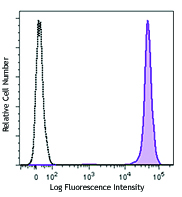
Compare Data Across All Formats
This data display is provided for general comparisons between formats.
Your actual data may vary due to variations in samples, target cells, instruments and their settings, staining conditions, and other factors.
If you need assistance with selecting the best format contact our expert technical support team.
-
Purified anti-Cytokeratin (pan reactive)
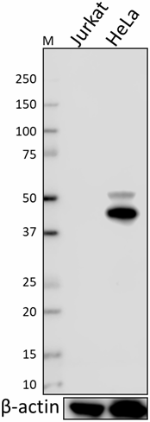
Whole cell extracts (15 µg protein) from Jurkat (negative co... 
MCF-7 cells were stained with purified anti- Cytokeratin (pa... 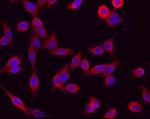
Hela cells stained with purified mouse monoclonal antibody a... -
Alexa Fluor® 647 anti-Cytokeratin (pan reactive)
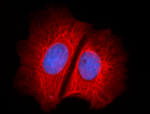
MCF-7 cells were fixed with 1% paraformaldehyde (PFA) for 10... 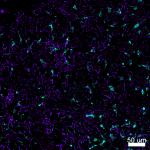
Confocal image of C57BL/6 mouse thymus sample acquired using... 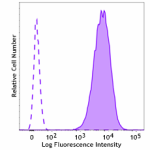
MCF7 cells were fixed and permeabilized using Cyto-Fast Fix/... 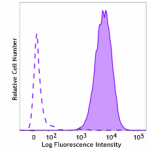
MCF7 cells (positive control, solid histogram), and Jurkat c... -
Alexa Fluor® 594 anti-Cytokeratin (pan reactive)
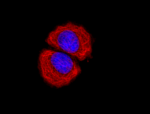
MCF-7 cells were fixed with 1% paraformaldehyde (PFA) for te... -
Alexa Fluor® 488 anti-Cytokeratin (pan reactive)

MCF-7 mammary adenocarcinoma cells were fixed, permeabilized... 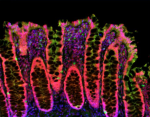
Human paraffin-embedded colon tissue slices were prepared wi... Mouse gastric organoids were fixed and permeabilized with PF...

 Login / Register
Login / Register 










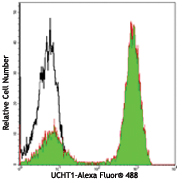
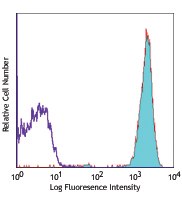




Follow Us